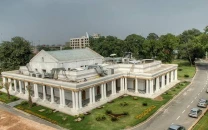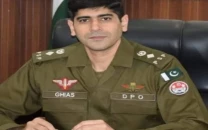Budget 2015-16: Punjab brings 10 new services under tax net
Sales tax on internet services withdrawn at last moment.

PHOTO: PAKISTAN TODAY
The 19.5% tax on internet services, which was imposed via a notification in May, was not included in the Finance Bill as the Punjab chief minister didn’t approve it after a series of protests by telecommunication and internet companies and other digital stakeholders.
The amendments were proposed by Punjab Finance Minister Ayesha Ghaus Pasha by presenting the Finance Bill 2015 in the Punjab Assembly.
As proposed in the bill, 10 new services brought under the tax net include public relation services, services provided by chartered accountants, auditors, corporate law consultants, air travel and transportation of goods by air (previously taxed by the federal government), chartered flights, hiring of equipment and machinery services, debt collection services, supply chain management services, photography services and sponsorship services.
Providing justification for including the new services in the tax net, the government claimed that inclusion of these services will bring further equity in the Punjab sales tax base and also harmonise the tax system with other provinces. The provincial government through the bill also imposed a tax on immoveable property in rural areas.
It has withdrawn the exemption given to immovable property in urban areas valuing Rs1 million in a bid to enhance equity in taxation on immoveable property transactions.
The bill stated that the exemption for capital value tax (CVT) is being widely misused by splitting transactions to avoid taxes.
Through the bill, some technical amendments were proposed in the Punjab Sales Tax on Services Act, 2012 to cover the issues relating to forensic audit, harmonisation of record maintenance provisions with the Federal Board of Revenue, rationalisation of pecuniary penalties for non-compliance with provisions relating to compulsory registration and provision of information, introduction of prize schemes for the general public and rewards to whistle-blowers.
The bill proposed that a whistle-blower who informs the Punjab Revenue Authority (PRA) about tax fraud leading to detection or collection of the tax, the reward would be given only on the information on which tax was collected. However, if a whistle-blower has provided false information, he will be liable to a penalty of Rs100,000.
The bill has proposed that the PRA may prescribe prize schemes to encourage the general public to make purchases only from registered persons issuing tax invoices.
To punish those who do not comply, the PRA has been empowered to impose penalty on the person who fails to produce the record or information despite the receipt of a notice from the PRA or any officer of the PRA directing him to produce such record or information, of Rs25,000 for the first default and Rs25,000 for each subsequent default.
Published in The Express Tribune, June 13th, 2015.
Like Business on Facebook, follow @TribuneBiz on Twitter to stay informed and join in the conversation.



















COMMENTS
Comments are moderated and generally will be posted if they are on-topic and not abusive.
For more information, please see our Comments FAQ